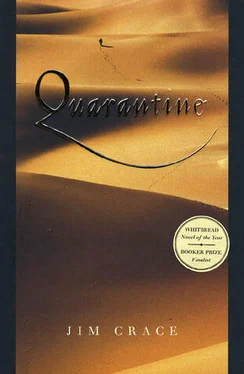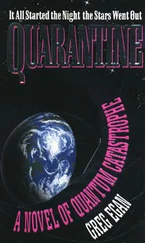Jim Crace - Quarantine
Здесь есть возможность читать онлайн «Jim Crace - Quarantine» весь текст электронной книги совершенно бесплатно (целиком полную версию без сокращений). В некоторых случаях можно слушать аудио, скачать через торрент в формате fb2 и присутствует краткое содержание. Год выпуска: 1998, Издательство: Straus and Giroux, Жанр: Современная проза, на английском языке. Описание произведения, (предисловие) а так же отзывы посетителей доступны на портале библиотеки ЛибКат.
- Название:Quarantine
- Автор:
- Издательство:Straus and Giroux
- Жанр:
- Год:1998
- ISBN:нет данных
- Рейтинг книги:4 / 5. Голосов: 1
-
Избранное:Добавить в избранное
- Отзывы:
-
Ваша оценка:
- 80
- 1
- 2
- 3
- 4
- 5
Quarantine: краткое содержание, описание и аннотация
Предлагаем к чтению аннотацию, описание, краткое содержание или предисловие (зависит от того, что написал сам автор книги «Quarantine»). Если вы не нашли необходимую информацию о книге — напишите в комментариях, мы постараемся отыскать её.
Quarantine
Quarantine — читать онлайн бесплатно полную книгу (весь текст) целиком
Ниже представлен текст книги, разбитый по страницам. Система сохранения места последней прочитанной страницы, позволяет с удобством читать онлайн бесплатно книгу «Quarantine», без необходимости каждый раз заново искать на чём Вы остановились. Поставьте закладку, и сможете в любой момент перейти на страницу, на которой закончили чтение.
Интервал:
Закладка:
Jim Crace
Quarantine
An ordinary man of average weight and fitness embarking on a total fast — that is, a fast during which he refuses both his food and drink — could not expect to live for more than thirty days, nor to be conscious for more than twenty-five. For him, the forty days of fasting described in religious texts would not be achievable — except with divine help, of course. History, however, does not record an intervention of that kind, and medicine opposes it.
Ellis Winward and Professor Michael Soule, The Limits of Mortality, Ecco Press, New Jersey (1993)1
Miri’s husband was shouting in his sleep, not words that she could recognize but simple, blurting fanfares of distress. When, at last, she lit a lamp to discover what was tomienting him, she saw his tongue was black — scorched and sooty. Miri smeUed the devil’s eggy dinner roasting on his breath; she heard the snapping of the devil’s kindling in his cough. She put her hand on to his chest; it was soft, damp and hot, like fresh bread. Her husband, Musa, was being baked alive. Good news.
Miri was as dutiful as she could be. She sat cross-legged inside their tent with Musa’s neck resting on the piUow of her swollen ankles, his head pushed up against the new distension of her stomach, and tried to lure the fever out with incense and songs. He received the treatment that she — five months pregnant, and in some discomfort — deserved for herself. She wiped her husband’s forehead with a dampened cloth. She rubbed his eyelids and his lips with honey water. She kept the flies away. She sang her litanies al night. But the fever was deaf. Or, perhaps, its hearing was so sharp that it had eavesdropped on Miri’s deepest prayers and knew that Musa’s death would not be unbearable. His death would rescue her.
In the morning Musa was as numb and dry as leather, but — cussed to the last — was gripping thinly on to life. His family and the other, older men from the caravan came in to kiss his forehead and mumble their regrets that they had not treated him with greater patience while he was healthy. When they had smeUed and tasted the sourness ofhis skin and seen the ashy blackness of his mouth, they shook their heads and dabbed their eyes and calculated the extra profits they would make from selling Musa’s merchandise on the sly. Musa was paying a heavy price, his uncles said, for sleeping on his back without a cloth across his face. An idiotic way to die. A devil had slipped into his open mouth at night and built a fire beneath the rafters of his ribs. Devils were like anybody else; they had to find what warmth they could or perish in the desert cold. Now Musa had provided lodging for the devil’s fever. He wouldn’t last more than a day or two — ifhe did, then it would be a miracle. And not a welcome one.
It was Miri’s duty to Musa, everybody said, to let the caravan go on throughJericho towards the markets ofthe north without her. It couldn’t travel with fever in its cargo. It couldn’t wait while Musa died. Nor could it spare the forty days of mourning which would follow. That would be madness. Musa himself wouldn’t expect such waste. He had been a merchant too, and would agree, ifonly he were conscious, God forbid, that business should not wait for funerals. Or pregnancies. Fortunes would be lost ifmerchants could not hurry on. Besides, the camels wouldn’t last. They needed grazing and watering, and there was no standing water in this wilderness and hardly any hope of rain. No, it was a crippling sadness for them too, make no mistake, the uncles said, but Miri had to stay behind, continue with her singing till the end, and bury Musa on her own.
She’d have to put up stones to mark her husband’s passing and tend his grave until the caravan returned for her. She would be safe and comfortable if she took care. There was sufficient water in skins for a week or so, and then she could locate a cistern of some kind; there were also figs and olives and some grain, some salted meat and other food, plus the tent, the family possessions, small amounts of different wools, a knife, some perfume and a little gold. She’d have company as weil. They’d leave six goats for her, plus a halting donkey which was too slow and useless for the caravan. Two donkeys then. Both lame, she said, nodding at her husband.
Nobody laughed at Miri’s indiscretions. It did not seem appropriate to laugh when there was fever in the tent, though leaving Musa behind, half dead, was a satisfying prospect for everyone. With luck, they said, Musa would only have to endure his suffering for a day or two more. And then? And then, when Miri had done her duty to her husband, they suggested, there would be habitations in the vailey where she could, perhaps, seek refuge. She might find a buyer for the gold; take care, they warned, for gold can bring bad luck as weil. Or she might employ the goats to buy herself a place to stay for her confinement — until the caravan had a chance to come for her and any child, if it survived. Eventually, she’d have the profits from her husband’s merchandise which they would trade on her behalf, the sacks of decorated copperware from Edom, his beloved bolts of woven cloth, his coloured wools. She smiled at that and shook her head and asked if they imagined that she was a halting donkey too. No, no, they said; why couldn’t she have more faith in their honesty? Of course there would be profits from the sale. They would not want to say how much. But she might be rich enough to get another husband. A better one than Musa anyhow, they thought. A smaller one. An older one. One that didn’t lie or use his fists so frequently, or shout and weep and laugh so much. One who didn’t get so drunk, perhaps, then sit up half the night throwing pebbles at the camels and his neighbours’ tents, pelting goats’ dung at the moon. One that didn’t stink so badly as he died.
They promised they would return by the following spring, one year at the latest. But Miri understood there’d be no spring to bring them back, no matter where they went. They’d make certain that their winters didn’t end. Why would they come so far to reclaim the widow and the orphan of a man who’d been so troublesome and unpredictable? Besides, they wouldn’t want to lose the profits they had made. Not after they had held them for a year. No, Miri was not worth the trip. That was the plain, commercial truth.
So Miri let them go. She spat into the dust as they set off along the crumbling cliff-tops to the landslip where they could begin their descent. Spitting brought good luck for traders. Deals were struck with a drop of spit on a coin or in the palm of the hand or sometimes even on the goods to be exchanged. Spit does better business than a sneeze, they said. So, if anyone had dared to look at Miri, they could have taken her spitting to be a blessing for theirjourney. But no one dared. They must have known that she did not wish them weU. They’d given her the chance to change her life, perhaps. But inadvertently. No, Miri despised them for their haste and cowardice. Her spitting was a prayer that they would lame themselves, or lose their cargoes in the Jordan, or have their throats sliced open by thieves, their eyes pecked out by birds. She felt elated, once the uncles and their animals had gone. Then she was depressed and terrified. And then entirely calm, despite the isolation of their tent and the nearness of her husband’s death. She would not concern herselfwith the practicalities oflife. Not yet. Women managed with much less. For the moment she could only concentrate on al the liberties ofwidowhood — and motherhood — which would be hers as soon as he was dead.
2
It was midday, and Miri opened up the outer awnings of the tent so that she could both clear the air of death’s bad breath and inspect the landscape for signs oflife. Did she expect the caravan, already troubled by its conscience, to tum around for her? Or was she simply fearful of the leopards, wolves and snakes which were at home amongst these hills? She sat cross-legged in bands ofsunlight, next to her husband’s wrapped body, her hand resting almost tenderly on his ankles. He had a fading pulse. And he was all but silent now. A whistling throat, that’s all. He’d lost the strength to shout. And he was cold. So was the inside of the tent.
Читать дальшеИнтервал:
Закладка:
Похожие книги на «Quarantine»
Представляем Вашему вниманию похожие книги на «Quarantine» списком для выбора. Мы отобрали схожую по названию и смыслу литературу в надежде предоставить читателям больше вариантов отыскать новые, интересные, ещё непрочитанные произведения.
Обсуждение, отзывы о книге «Quarantine» и просто собственные мнения читателей. Оставьте ваши комментарии, напишите, что Вы думаете о произведении, его смысле или главных героях. Укажите что конкретно понравилось, а что нет, и почему Вы так считаете.












